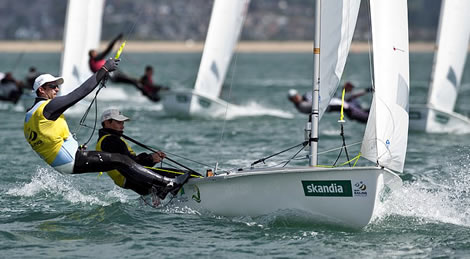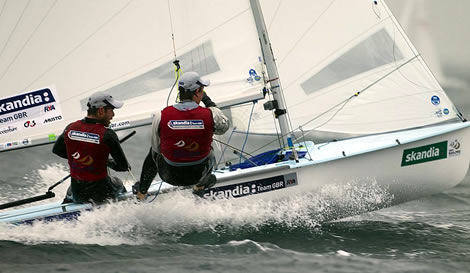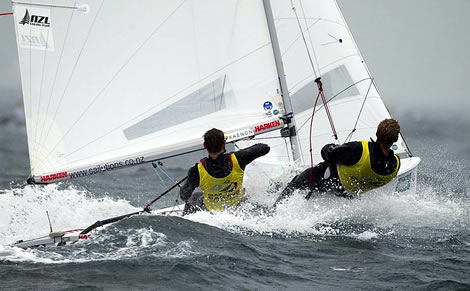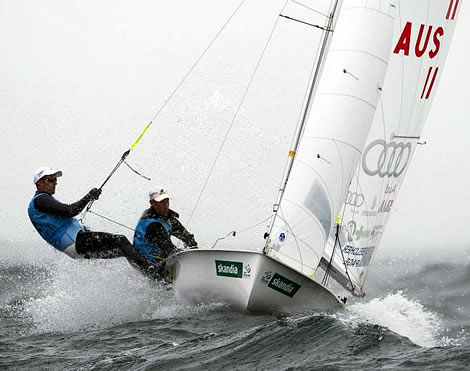London 2012 Olympic form guide: 470 Men
Download our 470 Men's Olympic form guide in pdf format here
Competition in the Men’s 470 doublehander sets sail today at London 2012 with yet another dominant Australian team way out in front on the form going into the competition.
At 40, Aussie crew Malcolm Page is not only the elder statesman of the fleet, but also the most successful 470 sailor of all-time, with six World Championship titles and an Olympic gold medal to his credit.
With his original crew Nathan Wilmot, Page narrowly missed out on Olympic selection for Sydney 2000, beaten by the eventual gold medallists Tom King and Mark Turnbull. However they were picked to represent Australia in the Men’s 470 at Athens four years later, but despite being favourites heading into the that Olypmiad, they bombed finishing 12th. After two more World Championships wins en route, this they put right in Beijing, securing Australia’s second 470 Gold in a decade.
For London 2012 Wilmot has retired, but Page has found another extremely capable replacement from the Australian 470 squad in Mat Belcher. With his then crew Nick Behrens, Belcher was ranked no1 in the World before Beijing requiring the management within the Australian Olympic Sailing Team to have a pleasant, but hard decision to make over who they should send to the pre-Olympics. They chose Wilmot/Page who won the Test Event and the rest is history.
Since then Belcher and Page, with the integral part in their campaign played by legendary coach Victor Kovalenko, the ‘medal maker’, have won three consecutive World championships leading into London 2012, the last, in June, they won with a day to spare. Since May last year they have competed at 12 regattas, won nine and at the three they didn’t win they finished second.
“When we first started campaigning together we wanted to raise the bar to a new level within 470 sailing and we feel we are really getting there,” says Belcher. “It is added pressure. We haven’t been beaten this year. That certainly carries a bit of pressure coming into the Games, but we have showed we can handle that over the regattas.”
As to how the competition has changed over this Olympic cycle, Belcher believes it has developed a lot, particularly in the professionalism of the crew and the technical understanding of the boats and their set-ups, the tuning, the dynamics between the coaches and the athletes, etc. “It is really enjoyable. You know that when you have a good day you have really had a good day, because you know how strong your competition is and you know if don’t and you get punished, it is just part of sailing. But it is fantastic racing because these guys are just so good and it is very rewarding if you get it right and it is what drives everyone to keep going.”
In terms of their preparation this year, Belcher observes that while most have stuck to the regatta trail, some, notably Team GBR’s Luke Patience and Stu Bithell, chose to not race any regattas, including the World Championship, between the Princess Sofia Trophy in Palma and Sail for Gold, where despite this unconventional approach the Brits romped home in a most respectable second.
Of the British program Belcher says: “It is a bit unusual. It wouldn’t work for us, but I’m not saying it wouldn’t work for them because Morgan [Reeser, the British coach] is an extremely experienced coach and Luke and Stu are very experienced sailors – two time silver medallists at the World Championships – so they know what they are doing and I guess the only way we can really tell is at the Games as to which strategy will come off at the end of the day.”
So why did the Brits do this?
After Patience and Bithell’s explosion on to the 470 stage, teaming and literally a week later coming 2nd at the 2009 World Championship in Denmark, throughout 2010 and 2011 the Brit’s results were mostly hovering around the 3-4th area and finishing second at the all-important Perth 2011 proved they had the ability to ‘switch it on’ when it counts and, significantly, was enough to secure their berth at London 2012.
But after this they appeared to have some difficulties. They went to Miami OCR, but after an uncharacteristic set of double figure results, ended up pulling out of the regatta two days before it finished. While the rest of the 470 teams have been eager to get in as much competition as possible prior to the Games, Patience and Bithell have not taken this option. There were concerns when they competed at the Princess Sofia Trophy in Palma in early April and finished 18th. They then didn’t compete in Hyeres, nor at the World Championship in Barcelona.
Did the wheels fall off in Miami? Patience answers with the look of someone who’s had to address this before: “We went to Miami primarily to sit down with Stephen Park [the RYA’s Olympic Manager] and Morgan Reeser, our coach, who lives in Miami. In hindsight we should have been more aware to the fact that we weren’t in a place where we were crazy mad about going racing a 470 at that point, because we were just off the back of selection. Actually what we were on was a rush of relief, a come-down and in hindsight we should have spoken to each other and gone ‘actually neither of us is that mad for the racing’. We went racing in among all of those meetings and obviously if your heart isn’t in it and you are there for other reason you get it handed to you and we got it handed to us.”
Patience continues: “We chose not to do the Worlds for the needs of our program – we felt we didn’t need to go and race in a championship down in Barcelona. Our program required that we clock in some good hours training in Weymouth in the Olympic waters, where it is all going to count. It was a good decision. We had some great day’s training down here and we are in a better place for it.”
So whereas the Aussies have enjoyed huge regatta success throughout this cycle, the British program has been intensely focussed on peaking for London 2012 itself, their program put together under the guidance of Park and Reeser.
“Everything we do is for a reason, we are not filling time,” says Patience. “We are doing things we do, because it is planned and there is a reason for us doing these things. We are on a path that will lead us to place when on 2nd August, day 1, 470 Men race 1 - we are meant to be there. A path we chose to be on led us to that point and we are on that path right now.” All very Zen.
“The Olympic Games is all about replicating your best performance and getting as close to that as you can.” And when Patience says ‘replicating’, he is not using the word lightly. “We are thinking about routines and processes, we’re thinking about what leg do I put in my wetsuit first, because that is what I always do, when do I take my last sip of water because that is what I always do; what way do I get out of bed in the morning before all of that, because that’s what I always do. We are machines to make sure we do the same thing every day.”
Regattas along the way are almost markers to see if this process is working. While their performance in Palma may have indicated there were a few problems still, at Skandia Sail for Gold this week, in Weymouth where it counted on the Olympic race tracks, they performed.
“Even Sail for Gold was an ‘outcome’ regatta, full of processes and little goals and like we did last year in Perth,” says Bithell.
Part of ‘the process’ also means managing distractions. “We have to walk from our accommodation into the boat park at the Olympics and we’ll probably walk past 20 people from security to the media, volunteers and everyone wants to ask how you’re doing. Parents, friends and family – they don’t realise that maybe a simple question is distracting you from the task in hand...” So if you ever wondered why Olympic sailors are at times anti-social, then there you have the explanation.
Changes over the last four years
The most obvious aspect of how 470 sailing has changed between Beijing and London is that Beijing was excepted to be an ultra-light wind venue, whereas Weymouth could be anything but is most likely to be moderate to breezy (as we have seen this week).
For Beijing kit was developed for light wind sailing, while crew weights, already light in the 470, plummeted even further.
“Nathan and Malcolm lost the most weight of anyone in the fleet without a doubt,” recounts British coach Morgan Reeser. “Nathan had the highest height to weight ratio on the whole Australian Olympic team in any sport.”
Luke Patience has a more gruesome tale: “People were skeletons - it was brutal. Joe Glanfield, the British 470 crew ate raw jellyfish one night and was just spraying out both ends for three days - which was perfect for weight loss!”
But with Weymouth, where conditions could be anything Patience says people are going for more generic boat set-ups, not pushing the envelope in any direction. “It is exciting – not one dimensional.”
Hardware
In terms of the basic equipment the majority of crews use, this has changed little over recent Olympiads. The majority are sailing boats made in New Zealand by Mackay Boats, although there are still a couple of Ziegelmayers in the fleet, used most notably by the French crew. Sails are consistently from North Sails Japan across the fleet with the Superspar M7 mast prevalent.
The area of development is in masts and centreboard. These vary according to crew weight and anticipated conditions as well as how you sail the boat, says Patience. “No one does it the same way. It is what you are used to and it is about making sure that the kit you have got you can make work. We could take the Aussies’ boat and go and sail it, but it might not work and they couldn’t make ours go fast, but with our own equipment we can be as fast as each other sailing wildly different stuff. It is the beauty of the sport and there are no right and wrongs and there are a million and one million variables to consider.”
As to how they go into the regatta when there is such a dominant leader in the class, Patience says they aren’t sailing at the Olympic Games to get silver. “They are very smart and experienced and consistent,” he says of the Aussies. “They are very good regatta builders. You never see them in a risky place. I might be wrong, but I wouldn’t say they were a very flarey team. They are nice and consistent and clunk away.”
For the Brits this Games is their first, whereas for the Aussies, it is Belcher’s second, Page’s fourth. So how are they likely to deal with the pressure? “So far we’ve handled very well - we rise to the occasion,” says Bithell. “We have always revelled in that environment as we have shown at two World Championships. But the Olympics is a different type of pressure - there is an expectation and things like that. We will control what we can control - is how we deal with it and we have got psychologists and people helping us out with that side of things. The honest answer is that we don’t know, however we have a process to follow when it comes.”
The Brit’s American coach Morgan Reeser is a veteran of the class, having started out in it back in 1985. He was second at the US trials in 1988, went to the Games in 1992 when he came home with silver and 1996 and was second at the trials for Sydney. He turned coach in 2004 and started with the British team coaching Christina Bassadone going into Beijing.
Of the pressure of doing the Games for the first time, Reeser says that most of this is in your head. “If you make a big deal about it, it will be, but at the end of the day there is a very veteran group around them with support staff and other sailors. At the end of the day it is just another regatta. If you want to make it bigger than it is, it is.”
As to the nature of his present steeds Reeser describes them: “They are both very talented. They are young and impetuous. They do their best when they are focussed on their job and not distracted. They have great powers of focus but it can go elsewhere! They love life so it is great to see. Luke is a great driver and Stu is a fantastic tactician and strategist. So upwind Stuart makes all the calls and Luke just listens and drives the boat fast with full confidence.”
The decision making on 470s varies from boat to boat, but Reeser says the way Patience and Bithell do this is same as John Merricks and Ian Walker used to.
“They are both very physical in the boat. There are uncomfortable and confused water conditions out there, so their physical-ness benefits them,” Reeser continues. “They are one of the bigger teams and certainly Luke is one of the smaller helms. That means more leverage, but more room for error if you’re not set up perfectly, which it is easy to do unless you guess right out there.”
Reeser says that there are many similarities between the British and Aussie teams. Physically they are similarly-sized and, despite what Patience says, they also sail the boat quite similarly. “Mat and Malcolm just do it very consistently. They are boring to watch! They start in the middle all the time, they go high upwind, they go low downwind, you know what they are going to do and they do it well. When Mat sailed with Nick Behrens before the last Games, they sailed a similar boring style – a lot of fifth places - and I think Malcolm has brought up their tactical decision making and speed downwind, so that has pulled the overall level up, but Mat was consistent and boring before!”
In contrast, Reeser says that the old combo of Wilmot and Page was originally quite risky. “I know Victor doesn’t like risk, he loves consistency and he enjoys their sailing now, I can assure you! But in Qingdao they sailed Victor’s style of a regatta and it paid off. Nathan would often win a lot of races and get a DSQ, but at the Games he didn’t win a race until the medal race. They didn’t even try to win the medal race, they just tried to stay out of the way.”
With the Aussies favourite, Reeser reckons there are four other teams in the fleet capable of winning Gold.
The Aussies are naturally great strong wind sailors and have been improving greatly in light conditions over this cycle. In contrast Croats Sime Fantela and Igor Marenic, who feature in second place in our rankings are the light wind specialists. “They are fantastic starters normally and they have the smallest crew in the fleet, so they don’t have leverage on their side, but they are both fantastic sailors,” says Reeser. Leverage becomes important in about 12 knots upwards (so Weymouth could prove tricky for them).
France’s Pierre Leboucher and Vincent Garos were on fire last year winning both the Test event and Skandia Sail for Gold, however this season their performance has been inconsistent – second at this year’s World Championship in Barcelona, but 17th subsequently at Sail for Gold. Reeser believes they will be a strong contender. “They are from Brittany so that weather doesn’t phase them much. The French have been good but they haven’t been good in the Olympics – they haven’t won many medals.”
Reeser also rates the young Kiwi crew of 21 year olds Paul Snow-Hansen and Jason Saunders. “They are sailing superbly.”
The experience Israeli helm Gidi Kliger and his new crew for this cycle, Eran Sela, can also never be discounted. “This is Gidi’s third games, even though he only looks 16!” says Reeser. “They are good all-round and they can get on streaks and reel off a lot of good races. They sail with a lot of risk in their game - OCSes and DSQs are not at all uncommon. Malcolm [Page] hasn’t had an OCS since December 2010!”
470 Men's Olympic form guide:
| Pos | Nat | Helm | Age | Crew | Age | SFG | WC | Hyeres | Palma | Perth WC | Test | SFG | WC | WC3 | Beijing | Rating |
| 2012 | 2012 | 2012 | 2012 | 2011 | 2011 | 2011 | 2010 | 2009 | 2008 | factor | ||||||
| Co-efficient | 8 | 8 | 4 | 4 | 6 | 3 | 2 | 1 | 1 | |||||||
| 1 | AUS | Mathew Belcher | 29 | Malcolm Page | 40 | 1 | 1 | 1 | 1 | 1 | 2 | 2 | 1 | 5 | 1 | 5.10 |
| 2 | CRO | Sime Fantela | 26 | Igor Marenic | 26 | 4 | 3 | 2 | 12 | 3 | 13 | 3 | 1 | 9 | 19.44 | |
| 3 | ISR | Gidi Kliger | 32 | Eran Sela | 27 | 8 | 8 | 6 | 2 | 4 | 3 | 5 | 10 | 11 | 14 | 22.90 |
| 4 | ESP | Onan Barreiros | 30 | Aaron Sarmiento | 25 | 5 | 7 | 11 | 23 | 9 | 8 | 7 | 17 | 8 | 5 | 36.40 |
| 5 | GBR | Luke Patience | 25 | Stuart Bithell | 25 | 2 | 19 | 2 | 6 | 8 | 2 | 40.59 | ||||
| 6 | FRA | Pierre Leboucher | 31 | Vincent Garos | 30 | 17 | 2 | 10 | 3 | 6 | 1 | 1 | 28 | 7 | 43.00 | |
| 7 | SWE | Anton Dahlberg | 27 | Sebastian Ostling | 28 | 9 | 24 | 16 | 11 | 6 | 9 | 14 | 24 | 15 | 43.00 | |
| 8 | NED | Sven Coster | 33 | Kalle Coster | 29 | 12 | 18 | 3 | 29 | 18 | 9 | 22 | 6 | 4 | 4 | 56.20 |
| 9 | NZL | Paul Snow-Hansen | 21 | Jason Saunders | 21 | 3 | 21 | 11 | 8 | 15 | 10 | 15 | 14 | 58.67 | ||
| 10 | ARG | Lucas Calabrese | 25 | Juan De La Fuente | 35 | 7 | 5 | 5 | 20 | 12 | 16 | 11 | 9 | 60.00 | ||
| 11 | GRE | Panagiotis Kampouridis | 29 | Efstathios Papadopoulos | 23 | 6 | 9 | 12 | 9 | 12 | 12 | 35 | 61.39 | |||
| 12 | POR | Alvaro Marinho | 36 | Miguel Nunes | 00 | 26 | 13 | 5 | 15 | 17 | 20 | 8 | 7 | 50 | 8 | 63.20 |
| 13 | USA | Stuart McNay | 31 | Graham Biehl | 35 | 13 | 25 | 14 | 21 | 13 | 11 | 25 | 13 | 21 | 13 | 65.40 |
| 14 | AUT | Matthias Schmid | 31 | Florian Reichstaedter | 32 | 10 | 19 | 19 | 20 | 21 | 10 | 27 | 42 | 6 | 24 | 66.10 |
| 15 | FIN | Joonas Lindgren | 26 | Niklas Lindgren | 24 | 16 | 4 | 15 | 8 | 22 | 14 | 21 | 19 | 39 | 67.60 | |
| 16 | JAP | Ryunosuke Harada | 27 | Yugo Yoshida | 28 | 22 | 6 | 7 | 7 | 23 | 18 | 18 | 3 | 69.44 | ||
| 17 | ITA | Gabrio Zucchetti | 35 | Pietro Zucchetti | 31 | 20 | 13 | 17 | 24 | 13 | 17 | 95.15 | ||||
| 18 | CHN | Weidong Wang | 29 | Daokun Deng | 34 | 4 | 29 | 35 | 28 | 26 | 26 | 97.79 | ||||
| 19 | GER | Ferdinand Gertz | 23 | Patrick Follmann | 23 | 18 | 12 | 16 | 22 | 15 | 28 | 112 | 93 | 99.22 | ||
| 20 | RUS | Mikhail Sheremetyev | 27 | Maxim Sheremetyev | 25 | 23 | 15 | 26 | 60 | 30 | 40 | 20 | 20 | 20 | 107.00 | |
| 21 | SUI | Yannick Brauchli | 24 | Romuald Hausser | 24 | 25 | 35 | 20 | 27 | 26 | 22 | 26 | 66 | 128.67 | ||
| 22 | IRE | Ger Owens | 33 | Scott Flanigan | 19 | 24 | 24 | 34 | 44 | 32 | 18 | 45 | 16 | 132.53 | ||
| 23 | TUR | Deniz Cinar | 27 | Ates Cinar | 26 | 28 | 23 | 46 | 40 | 41 | 24 | 64 | 53 | 28 | 133.56 | |
| 24 | CAN | Luke Ramsay | 24 | Mike Leigh | 27 | 21 | 22 | 21 | 39 | 29 | 30 | 53 | 67 | 62 | 137.00 | |
| 25 | KOR | Gunwoo Park | 31 | Sungmin Cho | 25 | 27 | 20 | 36 | 21 | 31 | 152.11 | |||||
| 26 | CHI | Benjamin Grez Ahrens | 19 | Diego Gonzalez Parro | 24 | 31 | 29 | 25 | 51 | 27 | 51 | 162.21 | ||||
| 27 | RSA | Jim Asenathi | 20 | Roger Hudson | 34 | 35 | 32 | 39 | 62 | 42 | 28 | 68 | 197.72 |














Latest Comments
bhill178 02/08/2012 - 14:17
It's Morgan ReeSer. 1992 Silver Medal in the 470.Add a comment - Members log in